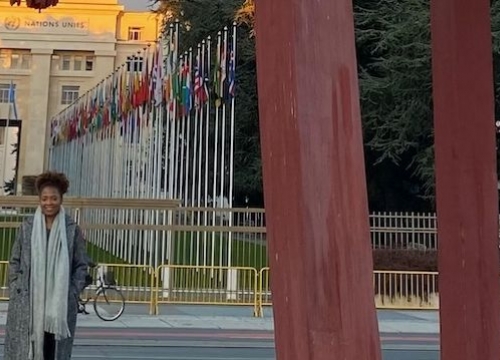MAS in Transitional Justice, Human Rights and the Rule of Law: What Our Students Say
18 January 2021
In this interview, Ely Cossio, currently enrolled in our MAS in Transitional Justice, Human Rights and the Rule of Law (MTJ), tells about the programme and life in Geneva
About Me
I’m Ely Cossio, from Quibdó, a city in western Colombia, on the Atrato River, in the Pacific coastal plain. I began my career in law at La Gran Colombia University and then pursued specialized studies in human rights and international humanitarian law at the Universidad Externado de Colombia, as well as an LLM at Duke University.
Before landing in this fantastic city and unique academic programme, I worked with the Colombian Truth Commission and the Due Process of Law Foundation (DPLF) in Washington DC. During my time with the Commission, I collected testimonies of victims of the Colombian armed conflict refugees in the United States. At DPLF, I supported the Impunity and Grave Human Rights Violations Programme, where I mostly provided technical assistance to civil society organizations to promote respect for human rights and to assess the experiences on reparations to victims of the civil war in El Salvador.
In my spear time, I will be drowned in a magical story of Haruki Murakami, or I’ll be doing some yoga or meditation. I love spending time with family and friends, cooking and dancing.
Why did you choose the MTJ at the Geneva Academy?
One characteristic feature of this programme is its interdisciplinarity. I was eager to learn about transitional justice (TJ) from a philosophical, health-psychological, sociological, and legal perspective. So far, the programme has exceeded my expectations and it has taken me out of my comfort zone, has challenged my critical thinking, and has helped me to learn and unlearn a variety of concepts in the field.
What are you particularly enjoying about this programme?
I enjoy the fact that I am surrounded by extremely talented people who come from different countries, and who turned out to become very special friends. The diversity of the MTJ and the multiplicity of professional backgrounds are what makes the classes more enriching. Besides, I appreciate the openness of our professors to discuss issues such as the role of TJ mechanisms to address events that are simultaneous of the past and present, such as slavery, and its impact in current times and generations.
Would you Recommend it?
I will recommend it without any doubt. If you are passionate about TJ and human rights, and if you are looking for a diverse environment where your knowledge and preconceived ideas will be constantly challenged, the MTJ at the Geneva Academy is the right place for you.
What are you planning to do next?
With COVID-19 and the uncertainty it brings, it seems almost fruitless to think about the future. Nevertheless, after I finish the programme, I expect to work either with international organizations or civil society actors that focus on the protection and promotion of the rights of victims affected by widespread human rights violations in different contexts.
Why did you choose to be photographed in front of the Broken Chair?
The broken chair is a symbol of both fragility and strength, precariousness and stability, brutality and dignity. This symbol reminds me of the reasons why I decided to study and work on TJ and human rights. I think it is astounding to have a symbol that memorializes the civilian victims of anti-personnel mines in Geneva and at the same time, a symbol – particularly its legs – that makes me think of the importance of the four pillars of TJ (truth, justice, reparation and guarantees of non-recurrence), and the role they play in strengthening democracy and the rule of law, promoting and protecting human rights and the dignity of victims, and nurturing stability and durable resolution of conflicts.







